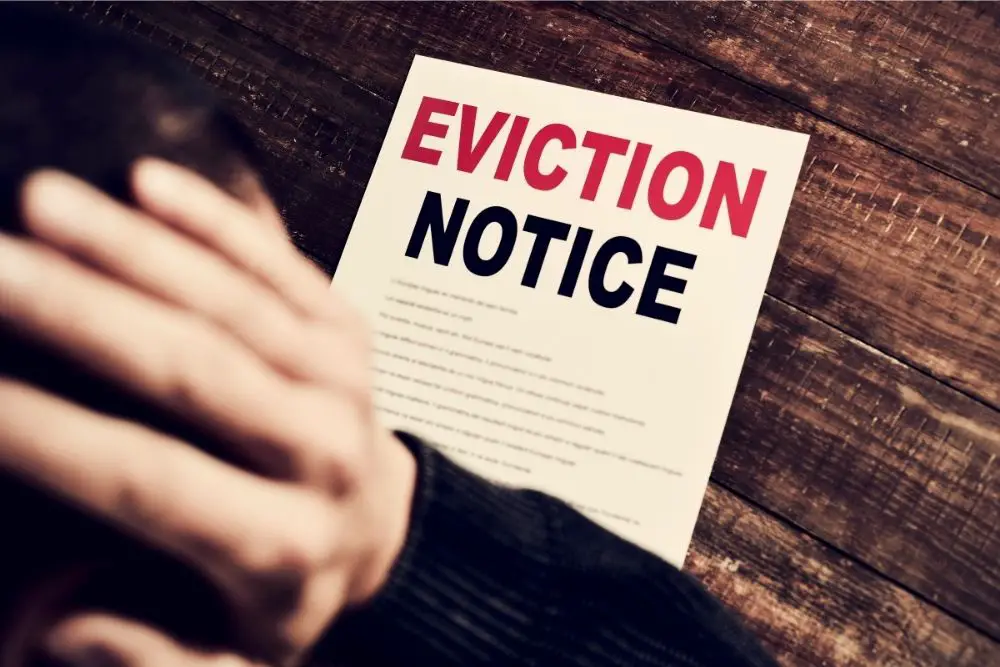Last Updated on May 11, 2022 by Fair Punishment Team
How long do you have to move out after getting an eviction notice?
If you’ve recently found yourself stuck with an eviction notice, then rest assured that you’ve come to the right article. Finding yourself with an eviction notice is never a nice situation to find yourself having to face, which is why we’re here to help you navigate through this tricky process as seamlessly as possible, as well as help you to come to a peaceful resolution, too.
Wondering how? Well, below, not only are we going to be talking you through how long you will have until you need to move out once given an eviction notice, but we are also going to be providing you with additional information that will help you to better understand your rights while dealing with an eviction notice.
Alongside this, we will also talk you through four helpful steps that you can take today to help potentially diffuse the situation and prepare you for the process should it go ahead. So, whenever you’re ready, just read on.

How long do you have to leave your home after getting evicted?
After you have been given an eviction notice, you will be given a set amount of time before you will need to pack up and leave your home. Even though the amount of time you will get will depend on the state that you live in, the typical amount of time that a tenant will usually be given is a period of around two weeks.
To be sure of how much time you will be legally entitled to, we recommend that you do a little bit of research to determine what the specific housing laws are in your state.
4 steps to take today:
So, even though getting an eviction notice can feel as though you’re stuck with no options on what to do next – the truth is, that’s not the case. It can be really easy to become overwhelmed or distressed if an eviction notice is looming over your mind, which is why we’re here to help you.
Below, we are going to be talking you through four steps that you can take today that will help you navigate through the eviction process as stress-free as possible so that you can reach a peaceful resolution. Let’s take a look at the 4 steps that you will be able to take today, below:
1. Make sure that you know your rights!
First things first, before you do anything else, you should first take the time to make sure that you’re well aware of what your rights are, as this will help to make sure that no mistakes have been made by your landlord.
Depending on where you currently live in the United States, it is highly likely that the rules and regulations regarding housing and eviction will be specific to the state that you live in, so you will likely need to do a little bit of research to discover what applies to your situation – and what doesn’t.
No matter what, however, it is very important to keep in mind that it is completely illegal for any landlord (in any state across the United States) to evict you without going through your state’s formal eviction process.
If you haven’t been given this, then please keep in mind that your landlord will be breaking the law, which means that you will not only be able to contest the eviction notice, but also take your landlord to court for breaking the law and not following best practices.
As we have already touched upon above, there are a variety of different housing laws that are specific to all of the different states across the country.
However, it is generally considered that in order to begin the eviction process – a landlord will need to provide the tenant with an eviction notice (so that it is recorded in a formal document) as well as communicate with you clearly what the situation at hand is, and why they have decided to go ahead with the eviction.
In addition to this, it is also important to keep in mind that you will also need to have been given the amount of notice officially recognized by your state, which is why we strongly urge you to do a little bit of research regarding the housing laws in the state that you currently reside.
In addition to all of this, it is also important to note that you will also be given the opportunity to appear in court to contest the eviction notice if you feel that it is appropriate.
However, do keep in mind that this could get pricey, so we only recommend that you push to appear in court if you genuinely believe that your landlord has made a mistake or not followed your state’s laws regarding eviction and housing. As a side note, in certain cities/states, you might be able to get free legal representation and assistance for your court hearing, although this isn’t always the case.
In order to check whether or not you will be able to get any monetary compensation, you will need to double-check what the “right to counsel” policy is in the state/city that you currently live in.
As a side note, court dates can sometimes be delayed, so if you do pay for any rent in-between the beginning of the eviction process and waiting for the court hearing to take place, then you should make sure to let your judge know this, as this will stand you in good stead.

2. Stay put in your home:
Even though we’re sure that you’re likely already well aware of this step, we still want to take the time to talk you through it as it is something that a lot of people tend to overlook.
After getting an eviction notice, it can be easy to think that you need to pack up and leave right away (especially with all the stress and anxiety that can come along with finding an eviction notice on your door) but it is very important to keep calm and remember that you don’t have to leave right away.
For starters, it is required by law for your landlord to provide you with a notice, which is a certain amount of time that you are legally entitled to before you will need to officially leave your home.
With that being said, if you have recently been given an eviction notice and told that you needed to leave immediately or given a timeframe that did not meet the minimum requirements set by your state’s housing laws – then you will be able to contest this and take it to court.
In addition to all of the above that we have just talked you through, during this time that you are legally entitled to, you will also be able to have the breathing room to not only figure out your next steps but also to potentially fight the eviction notice if you feel as though your landlord has made a mistake or been unfair in some way.
Let’s say, for example, you have made consistent payments for years but accidentally missed one, then you could take this to court for a hearing to judge – and then decide in the eye’s of the law whether or not your landlord was right to enforce an eviction notice, or whether you have been treated unfairly in the situation.
Never forget – you can always fight for your home, and it is well within your rights to do so. As a side note, as we have already mentioned above, it is important that you keep in mind that you might be entitled to monetary assistance and free legal representation should you decide to take the hearing to court.
However, in some states and cities across the United States, this monetary compensation isn’t always offered, so it is important that you make sure to do some research prior to pushing for the court hearing.
3. Don’t be afraid to ask for help
Getting an eviction notice can be an upsetting and scary experience – and it can be easy to feel muddled or confused as to what to do next when you find that you have been given one.
No matter what state that you live in, it’s very important to remember that you will be entitled to receive free help and advice, and depending on where you live, you will usually be able to receive this free counsel from a legal aid organization local to your area.
In some instances, you might even discover that there is information regarding helpful organizations listed on the eviction notice, usually at the back. Any of these kinds of groups will be able to provide you with clarity and help on the situation that you are experiencing, while also providing you with some advice on what steps you should take next.
Not only that but besides helping to put your mind at ease and helping you to see the light at the end of the tunnel – these types of legal organizations might also be able to help set you up with an appropriate lawyer, as well as any additional legal counsel you might need.
Even though you might not feel as though you need to reach out to these non-profit organizations, we strongly urge you to do so as they will help to settle any confusion or worries that you may have.
Not only that, but they will also be able to help you navigate through the situation as clearly as possible by providing you with an unbiased eye of the eviction, and whether or not it would be in your best interest to go to court or look for an alternative living arrangement.
In addition to all of the above, reaching out to a non-profit legal aid organization for assistance will also provide you with the opportunity to figure out whether or not your landlord has followed the law or not, as the organization will happily look into any worries that you may have.

4. Prepare yourself to appear in court
As we have already mentioned above, as soon as your landlord decides to get the ball rolling and provides you with an eviction note – you will be legally entitled to a court hearing to ensure that the right decision has been made.
Court hearings can be quite complicated and often off-putting (especially if you’ve never had to attend one before) which is why we strongly urge you to do a little bit of research prior to the big day in order to ensure that you are well prepared and know exactly what to expect.
Traditionally, all court hearings will usually take place in a standard court setting, although it is worth noting that it is becoming increasingly more common for court hearings to take place over Zoom and other video software due to the coronavirus pandemic.
In some instances, you might be required to attend the court hearing by abiding to all social distancing rules and any other rules implemented by the specific court hearing venue that you are going to be attending.
On the day of your court hearing, you will have the opportunity to argue your case in the eyes of the law so that a just decision can be made. If you feel that your landlord has broken the law or has done something unjust, then this will be the perfect opportunity for you to bring this up as you argue your case and fight to keep your home.
On the other hand, if you have missed any payments to your landlord, then you will also have the opportunity to explain to the judge why you weren’t able to make the payments at the time, as well as provide them with information on how you’re going to be able to keep up with payments in the future.
This will help to show the judge that you are a reliable lender and will be able to consistently make payments to your landlord once again. Everyone encounters financial hiccups from time to time, and this is something that will be taken into consideration by the judge.
Additionally, if you happen to have any documentation that clearly shows the financial issues that you have currently faced, then we recommend that you bring this along to the hearing with you.
This will help to strengthen your argument and show the judge that you have only experienced a temporary setback and that you will be able to begin making payments as normal once again to your landlord.
As a side note, we recommend that you try to get to the court at least 15-30 minutes before your hearing is set to take place, as this will provide you with the opportunity to get used to your surroundings and give you the chance to settle any nerves that you have prior to entering the court hearing.
The last thing that you’ll want to do is show up to your court hearing late – in some instances, the judge might even refuse to go through with the hearing!
Wrapping up:
So, there we have it! You have made it to the end of this article. After taking the time to read through all of the information above, we are now hoping that you are much clearer about how long you will have until you need to leave your home after being given an eviction notice from your landlord.
Alongside that, we are also hoping that you are feeling much more clear about what to do next as you navigate through this process – don’t forget that you have plenty of resources available to you to use, including the opportunity to reach out to a variety of different non-profit legal aid organizations who will be more than happy to help guide you through this process as stress-free and seamless as possible.
While you’re here, why don’t you give this page a bookmark? That way, if you ever need to come back and brush up on your eviction knowledge, then you’ll know exactly where to find us. Thank you very much for reading this guide – we hope that it has been helpful!
